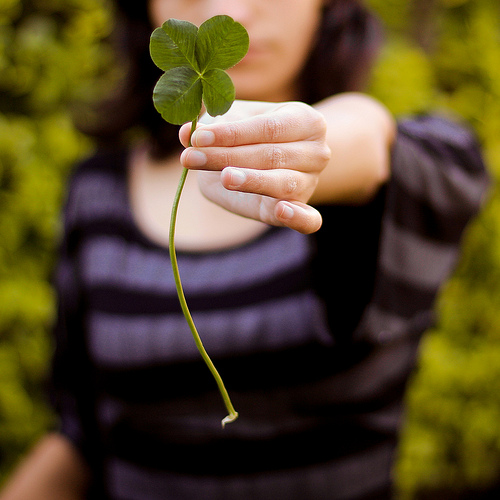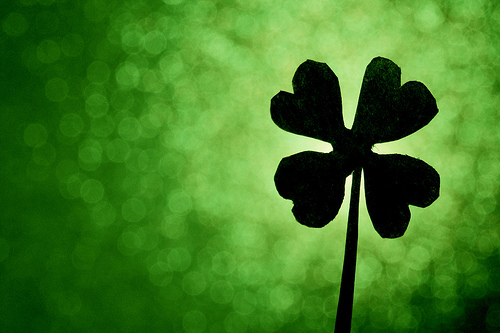6
Mar
March 6, 2013
 It’s March and Irish-Americans and their admirers are gearing up for St. Patrick’s Day, celebrating “the luck of the Irish.” It’s a great time to discuss the oft-overlooked “adoption stereotype”: The Lucky Adoptee.
It’s March and Irish-Americans and their admirers are gearing up for St. Patrick’s Day, celebrating “the luck of the Irish.” It’s a great time to discuss the oft-overlooked “adoption stereotype”: The Lucky Adoptee.
As in , aren’t you so lucky to have been adopted?
Why Calling Adoptees “Lucky” Misses The Mark
The well-meaning and the misinformed might say, “Isn’t it lucky that your parents adopted you, so you could have a better life?”
With luck comes the requisite gratefulness, specifically when it comes to international adoptees. It’s so lucky you were adopted by a nice family here in the United States, aren’t you grateful?
Adoptive parents may adopt for the feeling of satisfaction that comes from “rescuing a child,” but here’s the rub: all children have a right to be raised by a loving family with their basic needs met.
I love Judy M. Miller’s recent article, It’s Not About You. The post pertinently underscores my message today: adoption is not about making a child think he should feel “lucky” for having been “rescued” from a life of poverty.
My good friend, fellow adoptee and blogger, Lynn Grubb recently addressed her own “lucky adoptee” status saying,
As a child who needed a family, it shouldn’t matter whether I grew up in my biological family or my adopted one. As a relinquished newborn, I was a hot commodity–however, my fate may have been as a child in foster care. But even if I was languishing in foster care, as a child–I was entitled to a family just like everybody else. All children are.
Yes, every kid is entitled to a safe, loving environment.
As a mom with young non-adopted children, I want them to be grateful for what they have, to appreciate it, maybe even to feel lucky when they get to do something fun and unexpected. However, this gratefulness is a general outlook that involves appreciating simple things in life. It’s distinct from anyone ever telling them they should feel “lucky” to be raised by my husband and me.
(Couldn’t we all–adopted and non-adopted–learn to be more grateful in our everyday lives?)
Rethinking The “Lucky Adoptee” Concept
But let’s return to this notion of adoption luck. Why can’t adoptive parents simply celebrate adoption? Why does everything have to be so darn complicated? Why are adult adoptees such downers?
Okay, okay, I get it, of course prospective adoptive parents are looking forward to completing their families, no argument there.
Of course adopting parents feel ecstatic when they finally get the call that they are going to be parents, especially after a long wait and tons of hurdles.
Of course parents want to celebrate when their (adoptive) child joins their family; it’s normal and appropriate.
One way to rephrase the “lucky” idea (if you’re so inclined to correct people) is to shift-the-luck, so to speak. Parents are the lucky ones. Actually, any parent–with biological or adoptive kids–is lucky and grateful for a happy, healthy child.
In this way, adopting parents can be excited to welcome a child into their family, while remembering their child’s loss. While acknowledging the relinquishing mother’s loss of her baby–no matter what the circumstances were.
When crafting a child’s adoption narrative, at age-appropriate intervals, parents can frame the adoption within the context of happy and sad, joy and loss, new and old. It doesn’t have to be either/or … in adoption, yes, it can be both/and.
Rescuing A Child From Poverty Makes Her Lucky, Right?
But what about the stark reality that many internationally adopted children may have otherwise spent their lives in orphanages, institutions, or on the streets? Aren’t those children lucky? A.J., an international adoptee, points out that Lucky is only Half the Story,
I am blessed beyond measure to have left what would most certainly have been a life of poverty, hardship and struggle, for a new beginning in my parents’ house in Madison, Wisconsin. … But on the reverse, I lost my birth mother as a baby, had my birth cultural connections nearly completely snapped, and will never be as “Indian” as I would have been, had I never left. That reality is one that brings me great sadness.
The “both/and” idea can be particularly challenging for adoptive parents raising transracial children. Parents understandably want their child to “fit in” to their new life, but it’s important to acknowledge any child’s ethnic heritage. As adoptive mom of two transracial children, Alissa, points out,
Nobody is "lucky" to be adopted. I am told fairly regularly that my girls are lucky that we adopted them. People are usually trying to be nice, to compliment me. But something every adoptive family has to deal with on some level is that all adoptions begin with a loss. And no child is lucky to lose their first parents. Loving adoptive parents are great, but we’re not providing something extraordinary for our children. We’re providing them with the thing every child has a right to — a loving and safe family environment. And they shouldn’t have to walk around feeling indebted to anyone for that.
 So, What Do Lucky Adoptees Have In Common With “The Luck Of The Irish”?
So, What Do Lucky Adoptees Have In Common With “The Luck Of The Irish”?Irish luck is commonly thought to be extreme good luck, but some say this phrase is actually ironic.
Seriously. What’s “lucky” about a potato famine, lack of self-determination, and historical religious persecution? What’s lucky about arriving in the New World, only to find your kind discriminated against, despised, and mistreated?
Perhaps it’s that the Irish have historically been able to turn misfortune into fortune, coming to America, mining gold, and striking-it-rich. They can turn what was bad luck into something good.
So, here we have the intersection of adoptees and Irish luck: adoptees aren’t really lucky to have been adopted, and Irish weren’t truly that lucky throughout history, either.
But, if we want to re-write a stereotype, let’s say that adoptees are famously resilient, able to withstand loss and trauma, and come out on the other side that much stronger. And, perhaps the Irish are lucky in that way, too.
 Laura Dennis was adopted in New Jersey and reunited in 2001. A professionally trained dancer, Laura also worked as sales director for a biotech startup. With two children under the age of three, in 2010 she and her husband sought to simplify their lifestyle and escaped to his hometown, Belgrade, Serbia. While the children learned Serbian in their cozy preschool, Laura recovered from sleep deprivation and wrote Adopted Reality, a Memoir, available on Amazon. She currently blogs at Expat (Adoptee) Mommy.
Laura Dennis was adopted in New Jersey and reunited in 2001. A professionally trained dancer, Laura also worked as sales director for a biotech startup. With two children under the age of three, in 2010 she and her husband sought to simplify their lifestyle and escaped to his hometown, Belgrade, Serbia. While the children learned Serbian in their cozy preschool, Laura recovered from sleep deprivation and wrote Adopted Reality, a Memoir, available on Amazon. She currently blogs at Expat (Adoptee) Mommy.Photo Credit: Annais Ferreira, JD Hancock
For more information about MLJ Adoptions’ international adoption programs, please click here.
